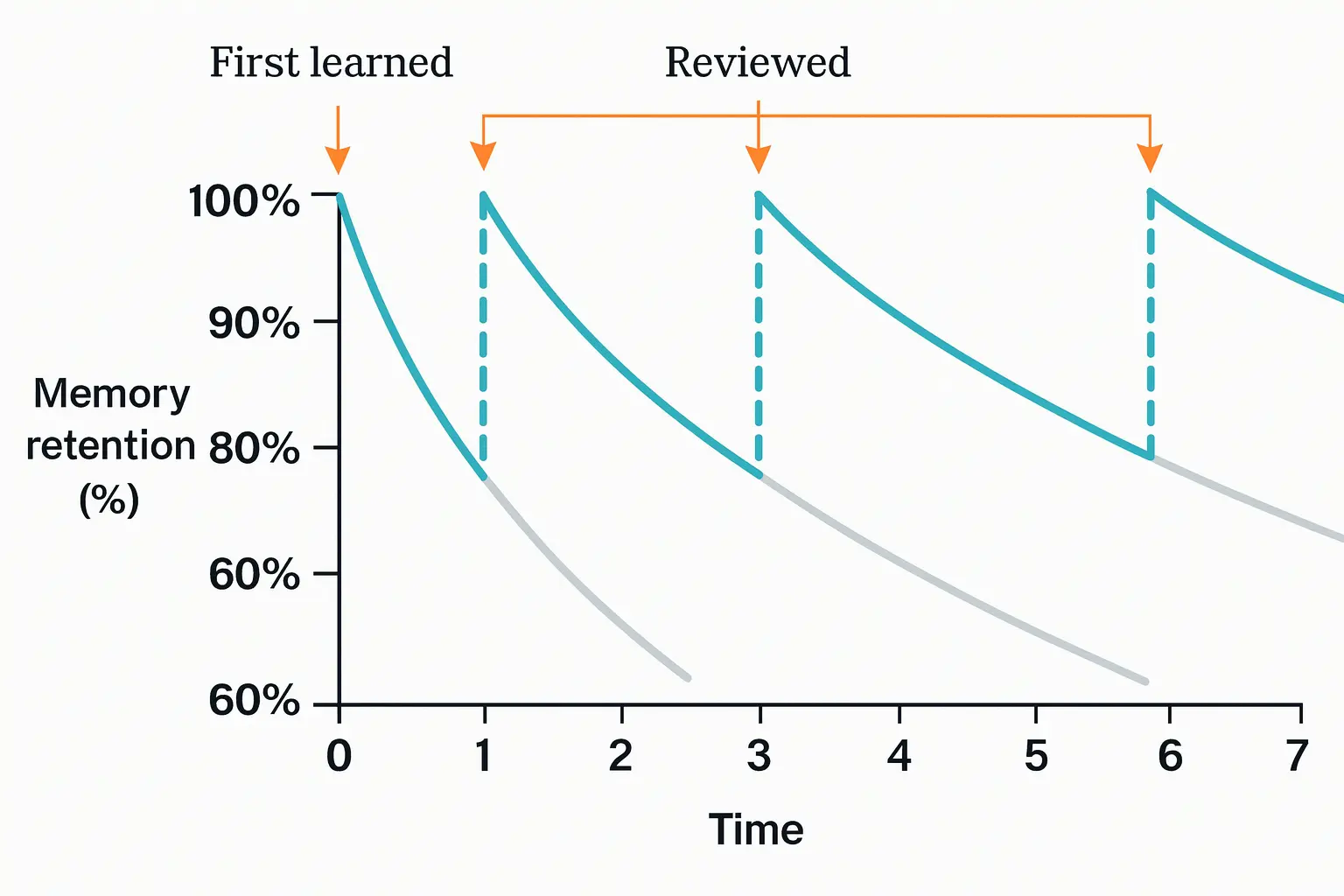BLOG
The Power of Repetition in Learning: How Memory Really Works


Tom Gillespie
Nov 11, 2025 • 6 minutes
Category:
Quiz Tips
The Power of Repetition in Learning: How Memory Really Works Why Repetition Matters We’ve all heard the phrase “practice makes perfect,” but in cognitive science, repetition does much more than refine skill – it literally reshapes the brain. Whether you’re revising for exams, learning a new language, or improving your general knowledge, repetition is the foundation of long-term retention. Apps like Quizified and Duolingo use scientifically validated methods such as spaced repetition to ensure knowledge moves from short-term to long-term memory. Unlike traditional “cramming,” this technique exploits how the brain’s synapses strengthen through repeated activation, forming durable neural connections that support learning over time. The Neuroscience Behind Repetition How Synaptic Plasticity Creates Memory Learning involves changes in the brain’s neural network. When information is revisited repeatedly, it enhances synaptic plasticity – the ability of neurons to strengthen their connections in response to activity. This biological process supports long-term potentiation (LTP), a critical mechanism for creating enduring memories. A 2022 study published in Frontiers in Behavioral Neuroscience explains that spaced repetition enhances LTP by reactivating memory traces at optimal intervals, reinforcing neuronal connections each time. Essentially, every time you review information, the brain reopens and re-solidifies the pathway that stores it – a process comparable to deepening a trail with every walk. Why Timing Matters It’s not just how many times you repeat information, but when. Repetition spaced over time takes advantage of the brain’s consolidation cycles, allowing information to stabilise before being reactivated. This timing aligns with sleep-dependent consolidation, during which the brain organises and stores new knowledge more efficiently. The Ebbinghaus Forgetting Curve: A Century of Insight In the late 19th century, German psychologist Hermann Ebbinghaus discovered that people forget newly learned information at an exponential rate – a phenomenon now known as the forgetting curve. Without review, we can lose up to 70% of what we learn within 24 hours. However, Ebbinghaus also demonstrated that systematic repetition at expanding intervals drastically slows this decline. Modern research confirms his findings. Studies such as Cepeda et al. (2019) show that learners who review material using spaced intervals outperform those who study in single, massed sessions. This is why tools like flashcards or SRS (Spaced Repetition Systems) work so well – they schedule reviews just before you’re likely to forget, keeping the memory alive and strengthening it further each time. For insights on why regular learning beats weekly cramming, read Daily Practice vs. Weekly Cramming. Scientific Evidence for Spaced Repetition Language and Science Learning Studies The benefits of spaced repetition extend across multiple disciplines. In language learning, repeated exposure to vocabulary improves both recall and pronunciation accuracy. A 2023 study from the Universidad de La Rioja found that students using spaced repetition for English vocabulary retained over 40% more words after one month compared to those who studied in single sessions. Similarly, in science education, students exposed to key concepts over spaced intervals achieved higher long-term performance scores and were better able to apply knowledge in problem-solving contexts (Cepeda et al., 2019). These results underline that spaced learning is not just efficient – it’s transformative, helping learners integrate new information into their broader knowledge networks. From Experimental Labs to Real-World Apps Originally tested in controlled environments, spaced repetition has since proven effective in digital education. Apps like Quizified, Anki, and Duolingo integrate spaced algorithms that automatically reschedule questions or lessons based on your performance – making the science effortless for the learner. In practical terms, the app becomes your memory coach, ensuring you revisit information just as you’re about to forget it. This smart scheduling keeps your brain challenged without overwhelming it, aligning perfectly with Cognitive Load Theory discussed in Learning with Mobile Apps. How Flashcards and Quizzes Reinforce Memory Flashcards, one of the oldest yet most effective repetition tools, leverage active recall – forcing the brain to retrieve information from memory rather than merely recognising it. Active recall strengthens retrieval pathways, making future access faster and more reliable. When combined with spaced repetition, this technique produces what psychologists call “desirable difficulty” – the sweet spot between too easy and too hard. This balance triggers stronger encoding and retention, supported by research from Karpicke & Roediger (2008), which demonstrated that retrieval-based learning outperformed re-reading by over 50% in long-term recall tests. Quizified builds on this principle by gamifying quiz challenges. Users not only test recall but do so repeatedly over days or weeks, reinforcing memory through play. This fusion of repetition and engagement makes the learning process sustainable – and enjoyable. Discover more practical techniques in Techniques for Learning and Building General Knowledge. Why Repetition Improves Confidence and Motivation Repetition doesn’t just enhance memory – it builds confidence. As learners see improvement through repeated success, motivation naturally rises. This positive reinforcement loop activates dopaminergic pathways in the brain, linking achievement with reward, a process similar to how gamified apps keep users engaged. Research in Educational Psychology Review (2018) found that learners using spaced repetition tools reported higher satisfaction and lower anxiety, particularly when learning complex subjects. Structured progress gives a sense of control – a key ingredient for motivation, as supported by Self-Determination Theory (Deci & Ryan, 1985). See how gamification sustains motivation in Learning with Mobile Apps. How to Apply Spaced Repetition in Daily Life The good news is that repetition doesn’t require hours of effort. Here’s how you can build a habit based on proven techniques: These habits transform repetition from a chore into a simple, powerful system for lifelong learning. Learn how daily routines improve brain performance in Daily Practice vs. Weekly Cramming. Real-World Applications Beyond the Classroom Spaced repetition isn’t limited to students – professionals, language learners, and trivia enthusiasts can all benefit. Medical trainees, for instance, retain complex information longer when training modules include spaced reviews. Similarly, multilingual learners improve fluency and pronunciation through daily exposure rather than cramming vocabulary lists. The principle also applies to general knowledge. By regularly engaging with quiz-based apps like Quizified, users strengthen recall, broaden their cognitive range, and enhance mental agility, which supports both academic and personal development. Discover how trivia enhances cognitive flexibility in What Is Trivia? Why It Matters and How It Can Be Fun. Repetition is the Architect of Memory Repetition is not mere rote learning – it’s a scientifically grounded method for rewiring the brain for retention. From the Ebbinghaus forgetting curve to modern neuroscience, the evidence is overwhelming: information reviewed at spaced intervals strengthens neural pathways, reduces forgetting, and transforms short-term knowledge into lasting expertise. By combining the precision of spaced repetition with the motivation of gamified learning, tools like Quizified empower users to master any subject more effectively. Every correct answer and every replay strengthens your mind – one repetition at a time. Turn repetition into results.
• Start Small: Review a small set of facts daily – even five minutes makes a difference.
• Space Reviews: Revisit material after one day, three days, and a week, following the Ebbinghaus curve.
• Use Technology: Apps like Quizified or Anki automate optimal review intervals.
• Engage Actively: Test yourself using quizzes, not just reading or highlighting.
• Mix Subjects: Interleave topics to promote deeper understanding and flexibility.
Download the Quizified app today to make learning smarter, faster, and more rewarding.
Build habits that last – and watch your knowledge grow every day.